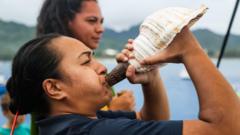In the Cook Islands, the debate over deep-sea mining is intensifying, with support for the venture coming from local leaders and citizens eager for economic growth. The polymetallic nodules, formed over millennia on the ocean floor, are believed to contain critical minerals essential for manufacturing green technologies, such as batteries for electric vehicles. The Cook Islands government, recognizing the financial potential, has issued exploration licenses to three companies, igniting hope for an economic transformation.
Jean Mason, the curator of the local library and museum, exemplifies the sentiment among advocates for mining. She emphasizes that such undertakings could allow future generations to enjoy educational and healthcare opportunities without relying on foreign aid. For many, including Prime Minister Brown, the venture represents a chance to change the island nation's economic tide after years of dependency on tourism, which was severely impacted during the COVID-19 pandemic.
Despite this optimism, environmental activists express profound concern about the implications of exploiting this relatively untouched part of the planet. Critics argue that insufficient research presents a significant risk to marine ecosystems that provide vital resources and opportunities for livelihoods. Leading activist Alanah Matamaru Smith calls for more time and independent research before progressing with mining plans, as the potential impacts on biodiversity and marine life remain largely unknown.
This growing tension underscores the struggle between economic aspirations and ecological preservation, particularly as many Pacific island nations grapple with the immediate threats posed by climate change. The Cook Islands' Exclusive Economic Zone spans nearly two million square kilometers, a resource deemed essential yet fraught with environmental uncertainty.
As protests emerge alongside mining plans, the islanders remain split on the future of their ocean resources. While some push for immediate action to reap potential benefits, others emphasize the need for caution, striving to protect both their environment and way of life. Understanding the true cost of such a venture will require a careful balancing act, both in terms of socio-economic benefit and environmental stewardship.
In summary, as the Cook Islands advances towards potential seabed mining, the conflicting grasp between economic necessity and environmental precaution echoes widely. Whether this pursuit results in a sustainable future or irreparable harm remains an open question that will depend on further dialogue and comprehensive research.
Jean Mason, the curator of the local library and museum, exemplifies the sentiment among advocates for mining. She emphasizes that such undertakings could allow future generations to enjoy educational and healthcare opportunities without relying on foreign aid. For many, including Prime Minister Brown, the venture represents a chance to change the island nation's economic tide after years of dependency on tourism, which was severely impacted during the COVID-19 pandemic.
Despite this optimism, environmental activists express profound concern about the implications of exploiting this relatively untouched part of the planet. Critics argue that insufficient research presents a significant risk to marine ecosystems that provide vital resources and opportunities for livelihoods. Leading activist Alanah Matamaru Smith calls for more time and independent research before progressing with mining plans, as the potential impacts on biodiversity and marine life remain largely unknown.
This growing tension underscores the struggle between economic aspirations and ecological preservation, particularly as many Pacific island nations grapple with the immediate threats posed by climate change. The Cook Islands' Exclusive Economic Zone spans nearly two million square kilometers, a resource deemed essential yet fraught with environmental uncertainty.
As protests emerge alongside mining plans, the islanders remain split on the future of their ocean resources. While some push for immediate action to reap potential benefits, others emphasize the need for caution, striving to protect both their environment and way of life. Understanding the true cost of such a venture will require a careful balancing act, both in terms of socio-economic benefit and environmental stewardship.
In summary, as the Cook Islands advances towards potential seabed mining, the conflicting grasp between economic necessity and environmental precaution echoes widely. Whether this pursuit results in a sustainable future or irreparable harm remains an open question that will depend on further dialogue and comprehensive research.






















